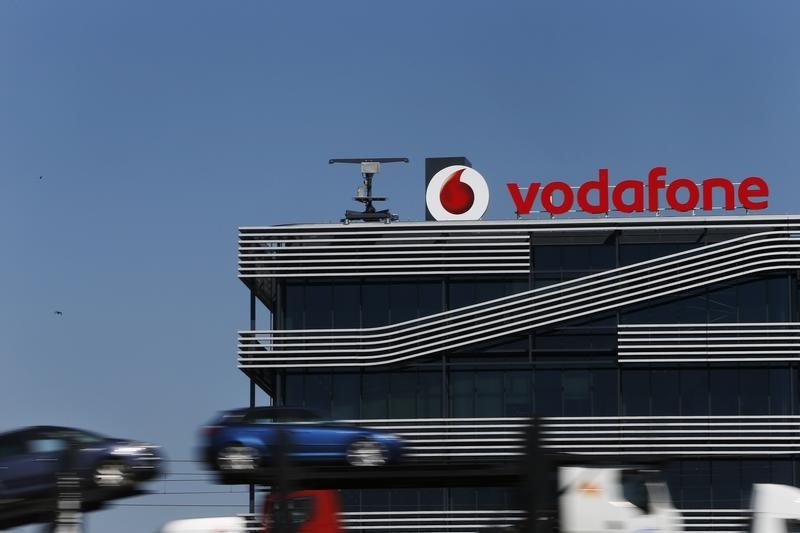By Kate Holton
LONDON (Reuters) - A generation after "Cable Cowboy" John Malone transformed the pay-TV sector in the United States, he is back in the spotlight -- this time in Europe, where he is plotting a role in the consolidation of the British telecoms market.
Top of the billionaire rainmaker's wish list is what would be a transformational deal between Liberty Global (O:LBTYA), the London- and Denver-based cable operator Malone chairs, and Britain's Vodafone (L:VOD). Combining their operations in Europe would create the continent's biggest communications company with broadband and mobile operations spanning several countries.
But with a market value of 61 billion pounds ($88 billion)and a wildly different approach to debt and dealmaking, the blue-chip British mobile operator, the world's second biggest, is not an easy fit.
Any attempt at a merger would also be complicated by Malone's preference for owning large chunks of the voting rights in his firms, meaning the 75-year-old may need to persuade Vodafone to swap assets or do individual market deals instead.
"John would like to do something in Europe, but he doesn't know what to do and is reluctant to give up his super votes which would be the case with Vodafone," an industry executive who knows Malone told Reuters on the condition of anonymity.
The executive added: "There aren't many deals out there. There's smallish things they could do but nothing that is transformative. Deal guys get frustrated when there aren't any deals to do."
The two companies this year agreed a joint venture in the Netherlands, a small market for both, in what was seen as a test case for compatibility after they failed to agree a deal in any other market despite months of negotiations.
The 50-50 joint venture after integration costs was valued at around 3.5 billion euros in combined revenue and capital expenditure. Vodafone paid 1 billion euros in cash to Liberty to equalise ownership.
The larger prize could be back on the table after European regulators last month blocked the sale of Britain's second biggest mobile operator, O2, to CK Hutchison (HK:0001).
With O2 back in play, the asset, owned by Spain's Telefonica (MC:TEF), could be used as a bargaining chip.
"If Vodafone felt that Liberty was serious (about looking at O2) they'd probably come back to the table," a top 10 Vodafone investor told Reuters, asking not to be named because of company policy.
He noted the talks in 2015 broke down over complications over valuations, not over the overall strategic vision.
"When they were in talks I don't think there was any debate around the strategic rationale or the size of the prize."
JOINING FORCES
Malone, the largest private landowner in the United States with 2.2 million acres, has built his empire over more than 40 years of dealmaking in the cable and pay-TV industry.
His Liberty Global is the world's largest international TV and broadband company, operating in more than 30 countries in Europe, Latin America and the Caribbean through a series of different brand names. In many of its markets, including Europe, it would benefit from owning a mobile operator, however.
Vodafone boasts 462 million customers across Europe, Africa, India, Turkey and Egypt, but only owns mobile in some of them and could use its own fixed-line assets.
Investors in favour of combining the companies' European operations say synergies would help address changed consumer behaviour, where millions of people now watch entertainment on mobile phones and through internet-connected TVs.
But although a deal may make sense on paper, analysts say there are several serious obstacles to making it a reality.
Malone owns around 24 percent of Liberty's voting shares, and merging Liberty and Vodafone's European bases would likely dilute that control.
"For him to do a transformational deal but lose control, it's not great," said one telecommunications banker, who asked not to be named. "It's a bit like selling out without a premium."
Arete analyst Steve Malcolm said the structure might not work for some Vodafone shareholders.
"There are plenty of shareholders who probably wouldn't mind him (Malone) having a lot of influence but there are some who simply can't own shares in a company where they are subordinated to a man who owns 5 percent of the equity," Malcolm said.
"The use of super voting shares means that Liberty Global has a quirky capital structure. It works for a very loyal band of Malone followers who are happy with the situation but it doesn't always work in a more widely-held UK Plc-type of company."
The two firms are also culturally different in other ways.
Vittorio Colao, who leads the FTSE-listed Vodafone, is much more cautious about debt-fuelled deals than his American counterpart. Vodafone had net debt of 29.2 billion pounds at the end of March, compared with its market cap of 62 billion pounds.
In contrast, Liberty is highly geared. Liberty Global Group had $45 billion of net debt, compared with a market capitalisation of $38 billion. Combining all the debt issued through its different brands, it is one of the biggest issuers of sub-investment grade bonds in the world.
And then there is tax. The fact that Liberty is able to use historical losses from its British operations to offset the tax it pays as a group would likely complicate any attempt to go the route of doing just a British deal.
Malone has said he believes the two firms would make a good fit. For his part, Colao regularly dances around the question.
"I almost see two lines that tend to go to the same point in the future," he told analysts in 2014. "So they're not parallel, but when will these lines cross it depends on the evolution of the company and the corporate strategies of two different entities.
"I cannot say when and what will determine the crossing."
($1 = 0.6936 pounds)
